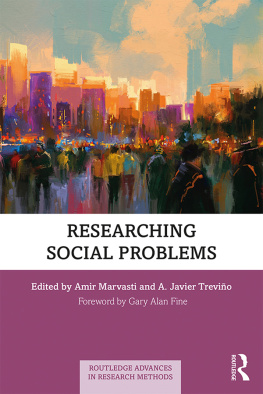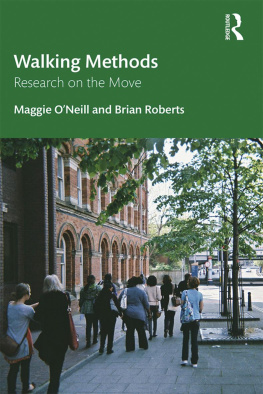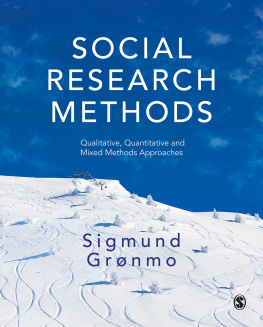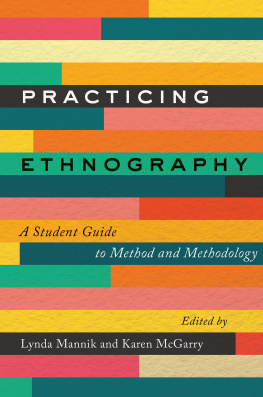The significance of Researching Social Problems stems from the focus on methods for studying the complex whats and hows of everyday troubles in relation to social problems. Narrative, context, image, and transformation are among the analytic concepts deftly addressed in this impressive compilation.
Jaber F. Gubrium, University of Missouri, USA
Researching Social Problems is an important and original contribution outlining an essential set of tools for the purpose of producing knowledge, specifically and uniquely regarding social problems. The book is unmatched in the field of social problems research.
James A. Holstein, Marquette University, USA
This is a stunningly useful resource for anyone teaching or using social research methods. The books carefully curated chapters are smart and lucid about contemporary research strategies and issues.
Lois Presser, University of Tennessee, USA
RESEARCHING SOCIAL PROBLEMS
This book covers a wide range of contemporary methods for researching social problems and connects these approaches to the broader substance and theories of social problems. Expository and discursive in approach, chapters follow a uniform structure, with each offering research examples and a broad description of the related method and its theoretical context, together with a how-to guide for applying that method using substantive examples from the field of social problems. For every method explored, there is a research example that fully reviews and illustrates the application of the particular method, before giving a full assessment of the methods strengths and weaknesses and latest developments. With chapters exploring survey research, in-depth interviews, narrative inquiry, institutional ethnography, participatory action research, auto-ethnography, Actor-Network Theory, experimental research, visual research methods, and research ethics, Researching Social Problems will appeal to scholars and students of sociology and politics working in the fields of research methods and social problems.
Amir Marvasti is Associate Professor of Sociology at Penn State Altoona, USA. His books on the pedagogy of research include: Qualitative Research in Sociology; Doing Qualitative Research: A Comprehensive Guide (with David Silverman); and The Sage Handbook of Interview Research: The Complexity of the Craft (2nd edition, with Jaber F. Gubrium, James Holstein, and Karyn D. McKinney).
A. Javier Trevio is Professor of Sociology at Wheaton College, Massachusetts, USA. He has served as president of the Society for the Study of Social Problems and has published numerous books including, Investigating Social Problems (2nd edition); The Cambridge Handbook of Social Problems (2 volumes); and Service Sociology and Academic Engagement in Social Problems.
Routledge Advances in Research Methods
Walking Methodologies in a More-than-human World
WalkingLab
Stephanie Springgay and Sarah E. Truman
Doing Research In and On the Digital
Research Methods across Fields of Enquiry
Edited by Cristina Costa and Jenna Condie
Qualitative Research as Stepwise-Deductive Induction
Aksel Tjora
Action Research in Policy Analysis
Critical and Relational Approaches to Sustainability Transitions
Edited by Koen P.R. Bartels and Julia M. Wittmayer
Doing Public Ethnography
How to Create and Disseminate Ethnographic and Qualitative Research to Wide Audiences
Phillip Vannini
Reflexivity
Theory, Method and Practice
Karen Lumsden (with Jan Bradford and Jackie Goode)
Dialectics, Power, and Knowledge Construction in Qualitative Research
Beyond Dichotomy
Adital Ben-Ari and Guy Enosh
Researching Social Problems
Edited by Amir Marvasti and A. Javier Trevio
For more information about this series, please visit: www.routledge.com/Routledge-Advances-in-Research-Methods/book-series/RARM
First published 2020
by Routledge
2 Park Square, Milton Park, Abingdon, Oxon OX14 4RN
and by Routledge
52 Vanderbilt Avenue, New York, NY 10017
Routledge is an imprint of the Taylor & Francis Group, an informa business
2020 selection and editorial matter, Amir Marvasti and A. Javier Trevio; individual chapters, the contributors
The right of Amir Marvasti and A. Javier Trevio to be identified as the authors of the editorial material, and of the authors for their individual chapters, has been asserted in accordance with Sections 77 and 78 of the Copyright, Designs and Patents Act 1988.
All rights reserved. No part of this book may be reprinted or reproduced or utilised in any form or by any electronic, mechanical, or other means, now known or hereafter invented, including photocopying and recording, or in any information storage or retrieval system, without permission in writing from the publishers.
Trademark notice: Product or corporate names may be trademarks or registered trademarks, and are used only for identification and explanation without intent to infringe.
British Library Cataloguing-in-Publication Data
A catalogue record for this book is available from the British Library
Library of Congress Cataloging-in-Publication Data
A catalog record has been requested for this book
ISBN: 978-1-138-09173-3 (hbk)
ISBN: 978-1-138-09174-0 (pbk)
ISBN: 978-1-315-10788-2 (ebk)
To Jennifer Platt, a true inspiration
Brandi Barnes received an MA degree in Sociology from the University of Memphis. Her research interests include medicalization and chronic illness, stigma, liminality, and autoethnography as a method of research.
Shannon K. Carter is Associate Professor of Sociology at the University of Central Florida. Her scholarship focuses on inequalities in reproductive health, with research on pregnancy and birth, breastfeeding, peer milk sharing, and transgender reproduction. She has published articles in numerous journals including Symbolic Interaction, Sociology of Health & Illness, and Breastfeeding Medicine, and a co-authored book with Beatriz Reyes-Foster, Sharing Milk: Mothering, Work and Emotional Materiality.
Aubrey DeLammermore has a Master of Arts in English Language and Literature. Her research interests include multi-ethnic American womens work in film, television, and literature. She teaches Introduction to College Writing, Exposition and Argument, and Composition II.
Marjorie L. DeVault is Professor Emerita of Sociology, Syracuse University, and lives in Brewster, Massachusetts. She has written extensively on qualitative and feminist research methodologies, especially institutional ethnography.
Lara Foley is Associate Professor of Sociology and Director of Global Scholars at the University of Tulsa. Her research focuses on narratives of occupational identity.
Farida Fozdar is Associate Professor in the discipline group of Anthropology and Sociology at the University of Western Australia. Her research focuses on issues of social inclusion for ethnic minorities, particularly migrants and people of refugee backgrounds. She teaches a unit on Social Research Ethics with Mark Israel, as part of UWAs Master of Social Research Methods. As a sociologist, her interest in research ethics is on questions of positive engagement with potentially marginalized communities.








